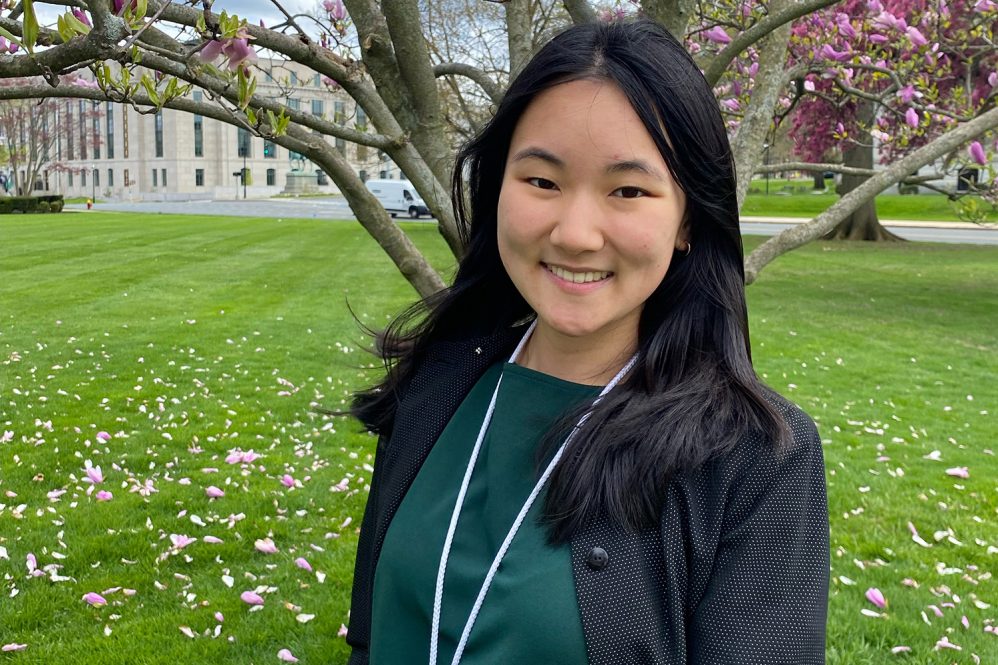Claire Lee ’24 (CLAS) dreams of one day becoming a lawyer. She wants to discuss real-world issues, speak truth to power, and above all, enact tangible social change.
This summer, she’s getting a head start.
“There’s a lot of improvement and change that the world needs right now,” says Lee, a rising junior from Glastonbury double-majoring in political science and ecology and evolutionary biology. “I wanted to try something new and meaningful.”
Lee has spent 10 weeks immersed in UConn’s TIP Innovation Fellowship Program, which pairs undergraduate and graduate students with startup companies in UConn’s Technology Incubation Program (TIP) for mentored research experiences.
The summer program receives more than 200 applications per cycle and includes students from nearly 20 different majors across the University. This year’s cohort of 33 fellows is the largest yet.
“It’s an experience that’s meant to build creativity and a different way of thinking about problems that isn’t taught in any other setting,” says founder and director Caroline Dealy ’89 Ph.D., an associate professor at UConn Health. “TIP fellows are not considered students by their host startup companies — they’re considered team members.”
As a fellow for Stamford-based Social Labs, Lee spearheads user research during the initial stages of product development. The company, which was founded by alumni Sahil Laul ’19 (CLAS) and Sameer Laul ’15 (CLAS), applies creative problem-solving to society’s biggest challenges by combining the arts, sciences, and humanities.
“Right now, we’re working on a novel journalistic platform that seeks to combine the power of communities with the speed of social networks as a tool for verified and organized information,” she says. “We think that access to reliable information around the world is a fundamental human right.”
Working alongside two other fellows, Lee helps identify the platform’s target audience in their quest to “deliver global truth through citizen news.” Part of her role includes evaluating what complex societal issues the company needs to address and helping users navigate through click bait headlines.
“Every product that is released into the market needs a user base,” she says. “I’m the one who oversees and develops that kind of strategy, while getting people better informed about what’s going on around us.”
My advice is to pursue opportunities that push you beyond your boundaries and challenge you to think differently.
Lee was instantly drawn to Social Labs’ multidisciplinary approach, as she had hoped to find an opportunity that would allow her to combine her interests. But it also didn’t take long to realize the abundant mentorship opportunities available to her.
“[I saw] that the founders were both UConn alumni and pursued academic paths that were very closely aligned with my interests,” she explains. “We connect on both a personal and professional level.”
Since 2012, the TIP Innovation Fellows Program has placed 189 UConn students — including 51 CLAS majors — at startups in one of UConn’s technology incubators in Farmington, Stamford, or Storrs. The immersion experience is complemented by weekly seminars on technology innovation, entrepreneurship, and career development.
“Unlike a traditional internship, these kinds of hands-on immersions build skills that are not necessarily specific to any particular job position,” Dealy says. “Rather, TIP fellows learn skills essential for any job in a 21st century workforce, like strategizing, problem solving, resiliency, critical thinking, and teamwork.”
Nine CLAS students are participating this year — three of whom, including Lee, are funded by the College of Liberal Arts and Sciences. Their projects include developing technology to eliminate per- and polyfluoroalkyl substances (PFAS) from water with host company Aqualumos, which was also founded by a UConn alumnus, and harnessing the power of music and synchronized light to stimulate brain rhythms in patients with Alzheimer’s disease with host company Oscillo Biosciences. The other CLAS students are engaged with projects in cancer diagnostics, antimicrobial surfaces, and artificial intelligence.
Lee says the program has set her up perfectly for her future, and she encourages other students to step out of their comfort zones.
“I’ve received a lot of important feedback for my career,” she says. “My advice is to pursue opportunities that push you beyond your boundaries and challenge you to think differently.”
To learn more about Social Labs’ current project, visit their website.
CLAS students participating in this year’s TIP Innovation Fellows Program include: Daniyal Athar, Jonathan Dias, Duran Gonzalez, Emma Graebner, Alicia Predom, Molly Schiffer, Shruti Susarla, and Mei Qiong Xue.



